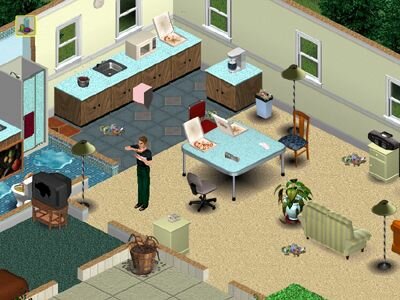latest blog entry
Several Years Behind
March 26th, 2007, By Duncan Gough
The GDC has been taking place and sparking off lots of interesting side issues and debates about the future of games. For sure, it seems that Casual Games play a big part in the grand scheme of things, and that’s credit to the people working on the Casual Games SIG, as well as the casual games developers themselves, who have struggled through issues of download size, try/buy business models, clones and Windows Vista, all from a purely indie perspective. Importantly, there is very real sense that game developers are looking to the web for inspiration. For a long time games have used the internet to provide multiplayer game services, but now they’ve seen what social networks, social software and web 2.0 can offer them. Obviously, like any big business wanting to cut its costs, user generated content is a massive boon. However, whilst it does cut the cost of creating all that content from scratch, it’s expensive from the perspective of creating passionate users and maintaining their interest. The last point is very important, since a game based on user generated content can be cloned by anyone else, so opening up your content become both a selling point and a weakness.
Still, it’s great to see that (casual) games and social software are continuing to weld themselves closer together. I’m pleased because I have a vested interest in that happening, of course, but I’m concerned because of the overriding, and fundamental, well, faith. Blind faith, it might seem, on behalf of the games companies.

There are two giant user generated, web 2.0 poster boys and girls – YouTube and MySpace. YouTube became massively popular in a short space of time simply because of the large number of pirated videos available – mainly TV shows. Google bought YouTube for $1.65 billion and slowly the copyrighted content is being removed, or tied into licensed/revenue sharing schemes. MySpace also grew massively popular in a relatively short space of time. News Corp bought the company for $580 million back in 2005, and as a result just about every website on the planet now boasts some kind of social networking features. However, it is generally agreed that MySpace’s website design is so bad, so user-unfriendly, that its very existence and popularity proves that luck is a large part of the success of social networking companies. No one can really explain why everybody flocked to MySpace originally, but they did, *despite* its features.
Looking at these two websites, then, it is hard to see why and how the big game companies, like Sony, are putting so much faith in merging games and social software. Whilst social software websites are profitable in the sense that they generate headlines, they rely soley on the users for their content, they were created for little or no money and they are sold for lots and lots of money, it’s hard to see that there is enough of a business model in there for large companies on which to bet the farm, so to speak. It’s a question of faith, in the web 2.0 model and in the game developers and users themselves. Moreover, that’s why it feels like blind faith.

None of that, however, worries me all that much. There are people much cleverer than I am working out solutions to these problems and I don’t doubt that Sony would bet the farm on anything, I’m sure they are well prepared for ideas like PS3 Home, their virtual apartment for avatars with multiple virtual asset purchase points available, failing. What really worries me, though, is that the game companies at GDC have looked at MySpace in the way that everyone has looked at MySpace – ‘it looks like crap but it sells (figuratively) like hot cakes’. Hence, the ‘me too’ response we’re seeing towards games and the web. However, there’s a reason why such a divide exists between web savvy people who recognise MySpace as ugly and outdated, and the millions of users who have their own MySpace page and regularly generate content across the service.
To put it simply, for the majority of surfers, MySpace is what websites look like.
That is to say, for the majority of surfers who aren’t enthusiasts, can’t code html, aren’t web or game developers, haven’t been online for more than a few years and so on, website are table-based, fixed width, somewhat badly laid out and work in a page-per-action way. Look at the major UK newspapers – The Sun, The Guardian and The Daily Mail – all fixed, tabular and not particularly pretty. This is how websites look back in the late 90s and this is how a lot of people expect web sites to look in the late 00s. For anyone who hasn’t been aware of the effects of a project like the CSS Zen Garden, then websites are ugly, with bad UI and user interfaces. MySpace, in that respect, works just fine in comparison.

So here’s where it gets problematic. If game developers are chasing the MySpace audience for games, and on the one hand opening up games to a wider audience will benefit us all, as the Nintendo Wii and DS have sought to acheive, on the other hand it risks game design being pegged back several years, whilst everyone catches up. There is bound to be conflict as games at the moment are bordering on better stories, threatening better AI (don’t they always), demonstrating better interaction (again via the Wii and DS), delivering in different ways (episodic, try/buy, subscription), moving into exciting always-on arenas (MMO’s and virtual worlds) and creating new genres (such as passive and casual games). Yet the MySpace-like attitude is going to lasso us all in with an audience whose game culture reference points are arcade machines, pong, pac man, space invaders and, most recently, the Sims. Is that the palette that we want to work with for the next five years? The next generation consoles are all looking at the MySpace audience, who are *several years behind*, and I have a niggling feeling that they’re looking for a cheap way to recoup the costs of their consoles. If they can cut costs for the lifetime of these consoles, then they’re golden. If user generated content can save them millions on game developer content, then they’re golden all over again. But the fact of the matter is, creating passionate users is hard. Probably even harder than creating passionate developers.
Unless, somehow, you can mix the two.
